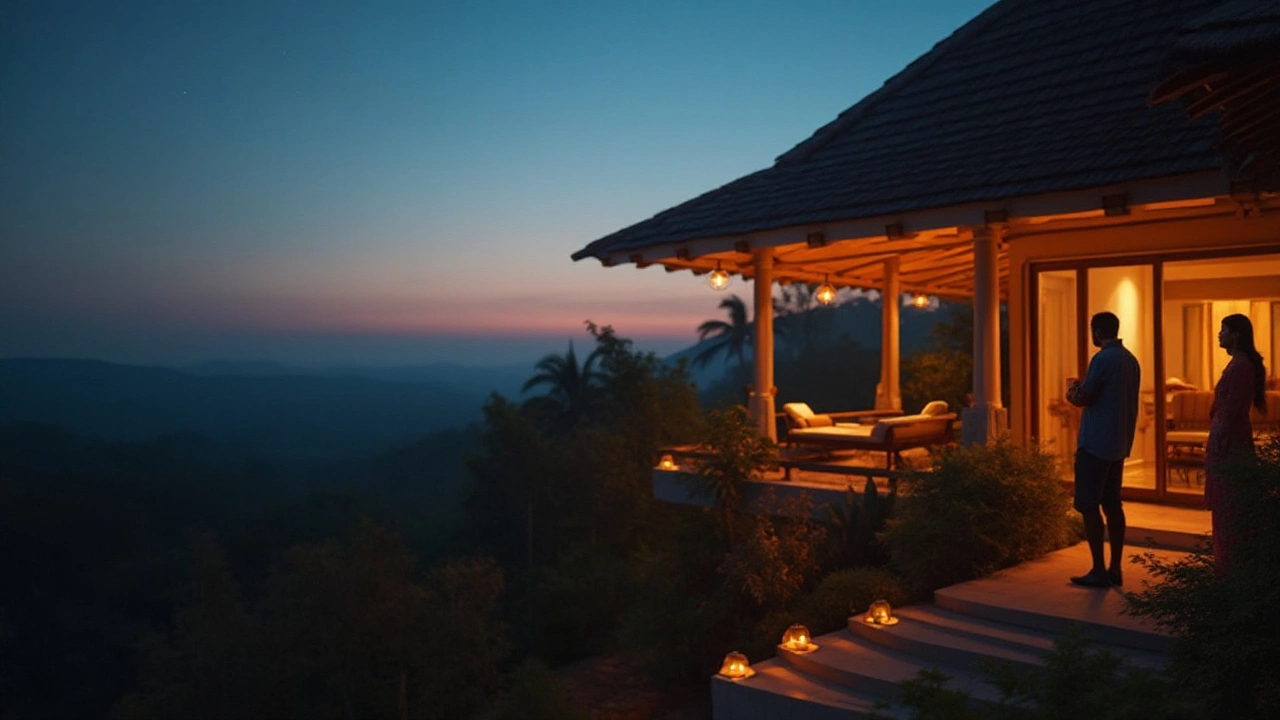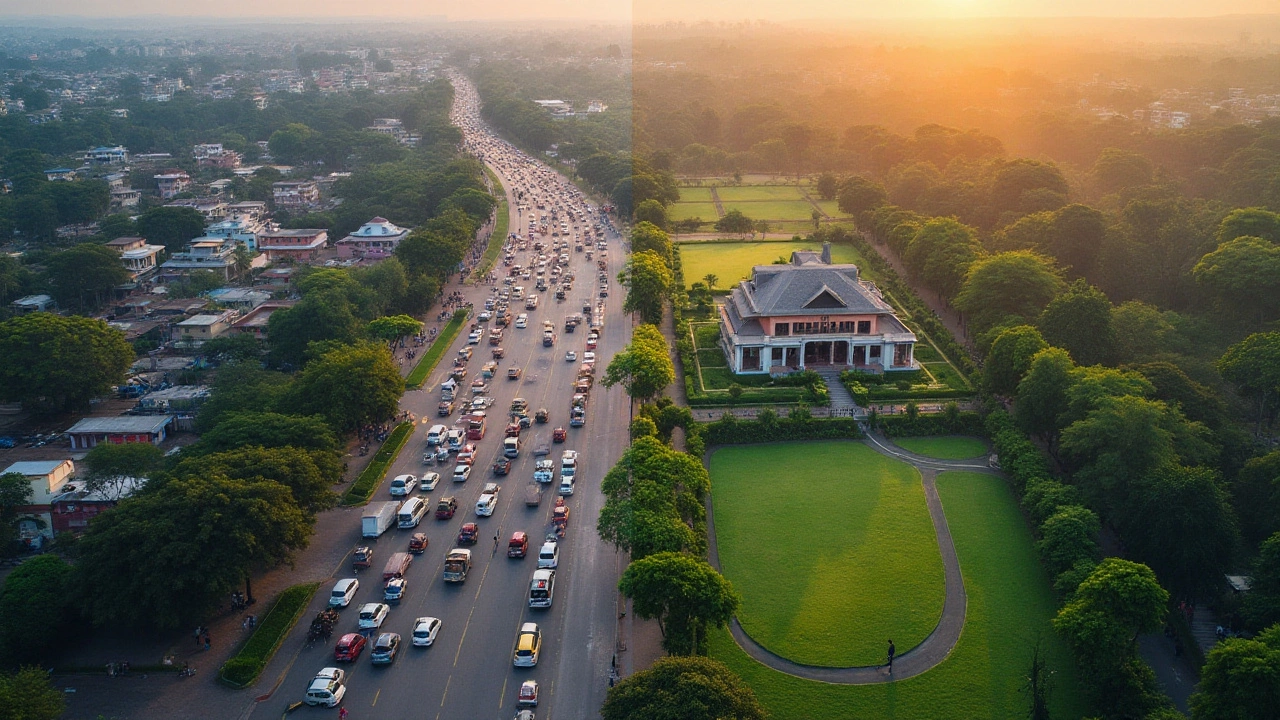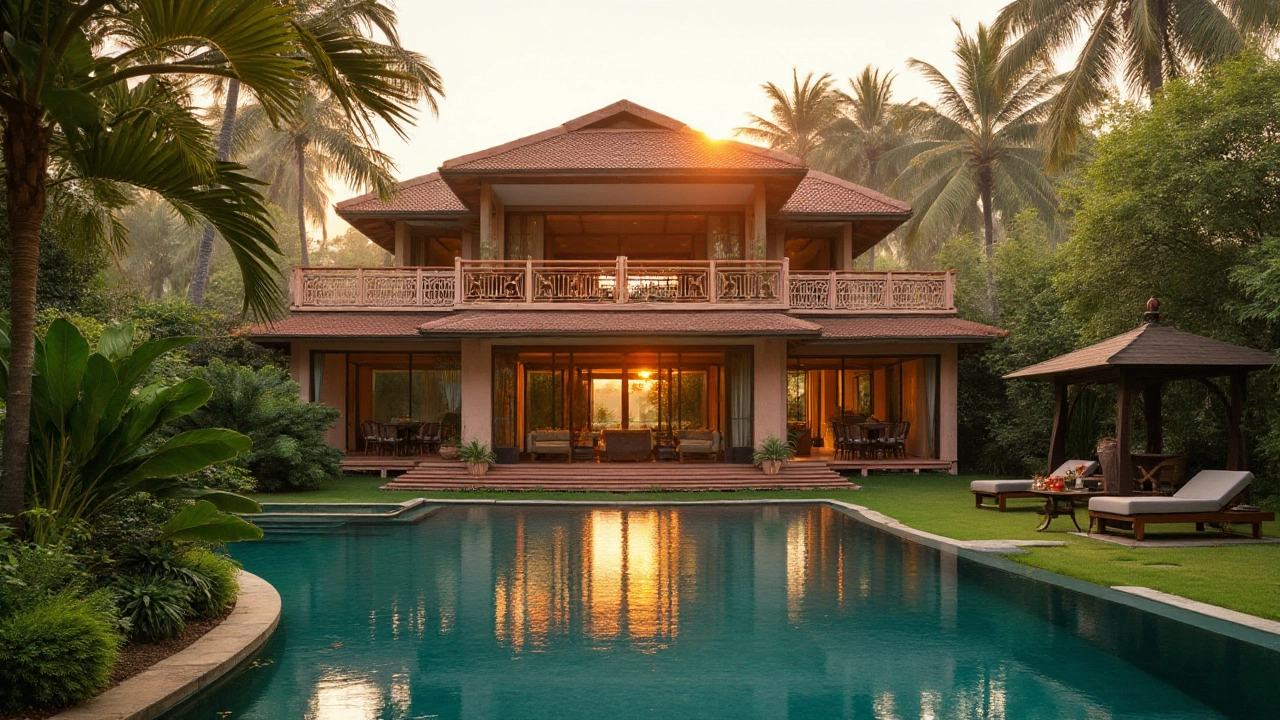The idea of living in a villa often conjures images of luxury, comfort, and exclusivity. Villas have long been associated with a certain prestige, offering a unique lifestyle unlike any other type of residence. But what is it really like to reside in one, and is it truly the right choice for everyone?
Villas provide ample space, privacy, and the kind of tranquility that many urban dwellers yearn for. They often come with gardens, pools, and sometimes even private gyms or entertainment rooms, making life all about ease and enjoyment. However, as with any significant lifestyle decision, there's more under the surface than meets the eye.
It's essential to weigh the perks against the responsibilities and costs that come with such a choice, from maintenance expenses to community regulations. In this piece, we'll delve into these topics, providing insights into what makes villa living both appealing and challenging. Let's uncover the realities of turning this dream into your everyday life.
Benefits of Villa Living
Living in a villa offers a lifestyle that's often dreamt about and admired from afar, promising a blend of space, tranquility, and exclusivity. For starters, villas are usually situated in serene locales that offer a retreat from the bustling city life, ensuring a peaceful environment. Imagine waking up to the sound of chirping birds and the absence of honking vehicles; such tranquility is a priceless aspect many urban dwellers miss. The spacious surroundings allow for more breathable space both inside and out, whether it's through expansive interiors or blooming, manicured gardens. These spaces often cater to not just families, but individuals who crave an atmosphere conducive to creativity and relaxation.
One of the key advantages is the privacy that a villa provides. Unlike apartment living where walls are often shared with neighbors, villas typically stand alone, offering a buffer from the outside world. This feature is incredibly appealing to those who value solitude and security, allowing the freedom to enjoy activities without the unsolicited oversight of close-by residences. The design of villas usually includes tailored architectural elements and high-end finishes that reflect the personal taste and lifestyle of the owner, adding to the sense of individuality and pride in one’s home. Moreover, many villas come equipped with luxurious amenities such as private pools, gyms, and entertainment rooms, making every day feel like a holiday.
If you're someone who loves to host gatherings, a villa offers ample space for entertaining guests, with most featuring expansive living areas, gourmet kitchens, and outdoor spaces that are perfect for dinner parties, celebrations, or simply unwinding with friends. This social aspect is further enriched by the seamless indoor-outdoor living that many villas in climates around the world embrace. Such flexibility is not just practical but also enhances lifestyle enjoyment, allowing homeowners to host barbecues or poolside soirees while nestled in the comfort of their private home. It's no wonder that villa living has become synonymous with affluent lifestyles and leisure-rich experiences.
In terms of investment, purchasing a villa can also represent a wise financial decision. Villas generally maintain their value well, largely owing to the land they sit on and their unique customizations. In certain markets, owning a villa can also present opportunities for monetization, such as vacation rentals, which is a growing trend in sought-after tourist destinations. Given these factors, investing in a villa may not just be about luxury living, but also a strategic addition to one's real estate portfolio. According to a report by the National Association of Realtors, properties with distinctive features, such as villas, often appreciate more steadily due to their uniqueness and appeal in competitive markets.
"Living in a villa offers not just a home, but a lifestyle marked by privacy, luxury, and unmatched personal space," remarks John Masters, a renowned real estate expert, shedding light on the allure of villa residences. "For those who value these attributes, the investment is truly rewarding."

Things to Consider
When contemplating a move to a villa, it's easy to get swept up in visions of grandeur – expansive gardens, a sparkling pool, and a picturesque view awaiting you every morning. Yet, there is a myriad of practicalities to ponder before taking the plunge into villa living. A villa provides not just a new home but a unique lifestyle, bringing both freedom and responsibility in equal measure.
First, consider the villa's location in relation to your everyday needs. While escaping to a green suburban or countryside setting is enticing, it's vital to assess proximity to essential services such as grocery stores, schools, hospitals, and even your workplace. A longer commute might give you more space at home but could affect your quality of life. Access to reliable public transport or major highways might mitigate some of these concerns.
Another aspect not to overlook is the community surrounding your prospective villa for sale. Villas often sit within well-managed gated communities featuring their regulations and amenities. From rules about noise levels or aesthetic modifications to clubhouses and tennis courts, understanding what the community offers – and what it demands – is crucial. Some might find the oversight comforting; others could feel it restricts personal freedom. ‘Each community develops its unique character and vibe, shaping the lifestyle within it,’ says renowned urban planner Mark Roland.
Maintenance is another major consideration. Villas usually include larger interior and exterior spaces, translating into more upkeep than a typical city apartment. This involves not just the daily chores but also long-term property maintenance such as roof repairs, landscaping, and other wear, and tear. If the villa includes a swimming pool or extensive lawns, factor in the extra time and costs associated with their care. Some communities offer shared services to ease this burden, while others leave it entirely to the owner's discretion.
Financial capacity is a key player in your decision-making process. It’s not just the upfront cost of purchasing a villa but the ongoing expenses that can add up. These include property taxes, utilities, and community association fees. A well-prepared budget will prevent unpleasant surprises. According to a survey by the Homeowners Alliance, 65% of villa owners underestimated their annual maintenance costs in their first few years.
| Expense Type | Average Annual Cost |
|---|---|
| Property Taxes | $4,000 - $8,000 |
| Community Fees | $2,500 - $6,000 |
| Utilities | $3,000 - $5,500 |
| Maintenance | $2,000 - $7,000 |
Lastly, consider whether the villa will continue to support your lifestyle over time. Think about potential family changes, health considerations, or work commitments that could alter the benefits of villa life. Many who embrace their villa home find a match for life, but being prepared for change is never a downside. Discussing your plans with friends or a trusted real estate advisor can offer new perspectives and reassure your decision-making process. With these elements under careful consideration, your journey to living in a villa can be a well-informed and gratifying experience.

Budgeting and Costs
When considering the transition to villa living, understanding the intricacies of budgeting and costs becomes pivotal. Unlike typical residential homes, villas often entail a larger financial commitment due to their size and the luxurious amenities they may offer. Initial purchase prices can vary widely based on location, size, and specific features. Villas in prime locations can command significant premiums, making it important to have a realistic budget from the outset. Beyond the purchase price, one must factor in ongoing expenses such as property taxes, insurance, and potentially, homeowners association fees, which can add considerable sums to your monthly outlay. The opulent nature of a villa, which is part of its charm, necessitates thoughtful financial planning to enjoy it fully without the burden of financial stress.
Next, consider the maintenance costs, which can be notably higher due to the larger space and more elaborate grounds. Regular upkeep of amenities like swimming pools, landscaped gardens, and possibly even tennis courts can significantly increase monthly costs. It's essential to set aside a budget for unexpected repairs or enhancements that might occur over time. A well-maintained villa not only ensures a comfortable living experience but also preserves the property’s value. It’s often recommended to get a professional assessment of potential maintenance requirements before committing to a purchase. Understanding these needs early can prevent unforeseen financial burdens and allow for more accurate financial forecasting.
It can be insightful to discuss financing options available for purchasing such properties. Traditional mortgages might not always be the best fit, and exploring alternative funding options could be beneficial. Additionally, investment perspectives can shift with villas; their perceived value often appreciates over time, particularly those in coveted areas or with historical significance. It's worth considering the long-term investment potential a villa might offer. As quoted in a recent Financial Times article, "For those with an eye on the future, investing in premium real estate can provide a blend of luxury living and robust investment returns." This perspective aligns well with the growing appeal of villas as both homes and wealth-building instruments.
Some might benefit from consulting with a financial advisor specializing in luxury real estate. They can offer personalized insights and strategies to align villa living with your financial goals. Property taxes, mortgage interest deductions, and other considerations differ significantly from those associated with city apartments or suburban homes. These discussions can offer clarity on potential tax advantages and liabilities, influencing the overall affordability and desirability of the investment. Understanding the legal and tax implications well in advance is crucial.
For those seriously considering a villa, a comprehensive financial plan that accommodates purchase price, ongoing expenses, and potential investment returns is indispensable. Analyzing comparable property values in the area can offer insights into the true market value and potential appreciation of your villa. Consideration of all these elements can facilitate more informed decision-making, ensuring that the step towards owning a villa fits seamlessly into your financial landscape.

Finding the Right Villa
Embarking on the journey to find the villa that perfectly fits your lifestyle requires more than just flipping through glossy brochures. The task involves a thoughtful blend of needs assessment, market understanding, and a knack for envisioning future prospects. First, it's essential to begin by evaluating your primary lifestyle requirements. Do you prioritize proximity to bustling urban areas, or is a more serene, suburban setting where your heart lies? Identifying this can streamline your initial search and prevent potential mismatches down the road. Additionally, factors such as local amenities, school districts, and commute times play a pivotal role, especially if you're considering a long-term stay.
Once you've narrowed down your preferences, diving into market research is the next crucial step. This often involves analyzing the current trends in villa for sale, which might indicate whether it's a buyer's market or a seller's market at your desired location. It’s insightful to collaborate with a real estate professional who has a deep understanding of the specific villa communities. According to Jerry Miller, a renowned real estate guru, "The best villa isn't always the one that sparkles at first sight; it's the one that aligns with your long-term aspirations." Indeed, searching for a villa is much like forging a relationship, where the potential for growth and harmony should never be overlooked.
Furthermore, inspecting potential villas is where the vision begins to take shape. This process often starts online but eventually leads to physical visits. During these visits, pay close attention to the architectural quality and maintenance of the property. It’s worthwhile to step into the shoes of a detective, gently probing into aspects like the age of appliances, the condition of wiring, plumbing, and structural integrity. A well-maintained villa often speaks volumes about its previous ownership and could save you from unexpected costs later on. For tech-savvy buyers, virtual tours have made exploration much easier, yet there's no substitute for experiencing the ambiance firsthand.
An often underestimated factor is understanding the community dynamics. Stepping into this new lifestyle means embracing a different kind of neighborhood interaction. Villas typically offer a more secluded experience, yet being a part of an engaged community can enhance the living experience enormously. Spend some time speaking with future neighbors if possible; their insights can be valuable as they shed light on both the standout features and any potential drawbacks in the vicinity. Remember, the aim is not just to find a house but to discover a home where memories will be built.
Last but certainly not least, consider your financial landscape and the investment potential of your prospective luxury homes. The initial cost is just a part of the equation; maintenance, unforeseen repairs, and homeowners' association fees, if applicable, can add layers to your financial commitments. Hence, drafting a realistic budget helps in securing a villa that doesn’t only resonate with your heart but also aligns with your financial blueprint. Balancing opulence with affordability is key, as it allows your villa experience to be both lavish and sustainable.

